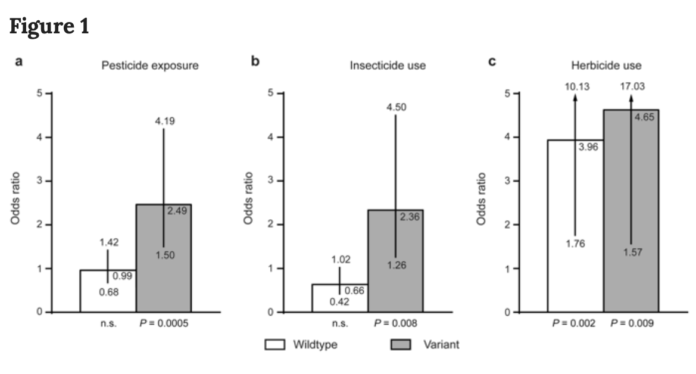Pesticide exposure is associated with increased risk of Parkinson’s disease (PD). We investigated in Egypt whether common variants in genes involved in pesticide detoxification or transport might modify the risk of PD evoked by pesticide exposure. We recruited 416 PD patients and 445 controls. Information on environmental factors was collected by questionnaire-based structured interviews. Candidate single-nucleotide polymorphisms (SNPs) in 15 pesticide-related genes were genotyped. We analyzed the influence of environmental factors and SNPs as well as the interaction of pesticide exposure and SNPs on the risk of PD. The risk of PD was reduced by coffee consumption [OR = 0.63, 95% CI: 0.43–0.90, P = 0.013] and increased by pesticide exposure [OR = 7.09, 95% CI: 1.12–44.01, P = 0.036]. The SNP rs1126680 in the butyrylcholinesterase gene BCHE reduced the risk of PD irrespective of pesticide exposure [OR = 0.38, 95% CI: 0.20–0.70, P = 0.002]. The SNP rs1803274, defining K-variant BCHE, interacted significantly with pesticide exposure (P = 0.007) and increased the risk of PD only in pesticide-exposed individuals [OR = 2.49, 95% CI: 1.50–4.19, P = 0.0005]. The K-variant BCHE reduces serum activity of butyrylcholinesterase, a known bioscavenger for pesticides. Individuals with K-variant BCHE appear to have an increased risk for PD when exposed to pesticides.
Rösler TW, Salama M, Shalash A, Khedr E,Abdelhalim El-Tantawy, Gharib Fawi, Amal El-Motayam, Ehab El-Seidy, Mohamed El-Sherif, Mohamed El-Gamal, Mohamed Moharram, Mohammad El-Kattan, Muhammad Abdel-Naby, Samia Ashour, Ulrich Müller, Astrid Dempfle, Gregor Kuhlenbäumer and. Höglinger GU. 2018. K-variant BCHE and pesticide exposure. Genetic-environment interactions in a case-control study of Parkinson’s Disease in Egypt.
Institute of Global Health and Human Ecology, American University in Cairo, Egypt
Dr Mohamed Salama established the first Translational Neuroscience Unit in Egypt. Mohamed’s collaborative research led to establishing the Egyptian Network for Neurodegenerative Disorders (ENND). Mohamed was selected as a SOT Global Senior Scholar in 2013 and Translational/bridging awardee in 2016. He was awarded by Parkinson’s and Movement Disorders Foundation (PMDF) for his continuing research in the field of neurodegeneration.
Recently, Mohamed and his colleagues succeeded to draft the first Reference Egyptian Genome and collaborating with other colleagues to start a national cohort (A Longitudinal Study of Egyptian Health Aging [AL-SEHA]). Currently, Mohamed is Atlantic senior fellow for Equity in brain health at the Global Brain Health Institute (GBHI) and Associate professor at the Institute of Global Health and Human Ecology at the American University in Cairo (AUC).



